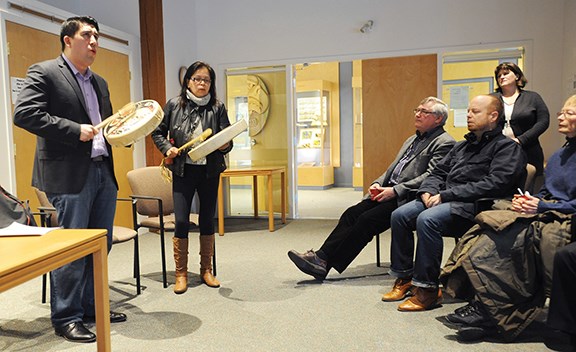Chris Lewis called on Squamish people to overcome fear of each other after a dark history between aboriginal and non-native people.
At the mayor’s breakfast held Friday at Squamish Public Library, the Squamish Nation councillor and spokesperson told an audience of about 35 people, “We must shine a bright light into the darkest corners of our history, our mutual history, so we understand what’s in that dark corner and we no longer live in fear of each other.”
Lewis, fellow Squamish Nation Councillor Richard Baker and elders Bob Baker, Shirley Toman and Gwen Harry shared emotional stories during the two-hour discussion.
The elder Baker talked about living frugally after his people were forced out of Kitsilano years ago. “The government gave our land away in Vancouver,” he said. “All the families moved up here. That is how Squamish built up.”
Before being sent to residential school, he was raised during early childhood by his grandmother, a basketmaker. “We had no spare money. We traded clothes.”
But, he added, “One thing about them days, we all looked after each other…. The way we are living is not the way to live. We should go back to the days where we helped each other.”
He also talked wistfully about travelling overland to Vancouver, building campfires and fishing along the way rather than driving on a highway.
“Things are still changing. I hope it changes for the best…. I don’t want to see no big companies coming in here and ruining our land. Money, you spend it and it’s gone. Land, you have for life.”
Toman was born on the Stawamus Reserve 74 years ago. As part of an extended family on the reserve, children could drop in anywhere “and if you were hungry, they would feed you,” she recalled.
But there was no running water in her home. When she was taken to residential school, she was amazed that she could turn on a tap and water would come out.
However, that was the only positive aspect of residential school, Toman said. She cried soon after arriving. “One of the things I remember is one of the bigger girls said to a young girl, ‘Go and beat her up.’ I had never been treated like that before. How could you even think about hitting anybody?”
Like many residential school students, she tried to run away several times, and the third time she went to the U.S. and became a berry picker. It was a tough life, she said, but better than residential school. “Anything was better than that…. The hatred and meanness, to be in that atmosphere was just so horrible.”
When she eventually returned to Squamish, she discovered life continued to be harsh, as “white boys used to come onto the reserve… to rape a couple of the girls.”
Life improved when she got a job at the hospital, scrubbing floors, finally able to buy her own sheets and blankets.
Harry also spoke about a rough childhood. In 1936, she and her sister were taken away to residential school in Alert Bay, where there was “no love, just supervision” for eight years. She became sick with tuberculosis and had to live in isolation in a hospital. “Going home was the hardest for me, because I didn’t know anybody. I didn’t even know my father. I was a stranger.”
When she got married, alcohol had become a big part of life, and when she quit the partying and drinking at age 30, “my life completely turned right around.”
Harry and her husband raised a family of leaders and artists as they worked with others who wanted to make Stawamus a better place for children, providing activities including sports such as lacrosse. “We wanted more for our children, and we did it.”
Richard Baker also shared the story of his childhood on Friday. He said he was sexually abused in residential school, ran away and later became an alcoholic and addict. It took years for him to overcome the anger at the way he and other aboriginal people had been treated. Having a judge apologize helped him to start to heal. “The judge said sorry…. We’re sorry we did this to you.”
Baker said he apologized to his own son for not being a good parent.
“I lived a lot of tough years,” said Baker, now a leader in the Squamish Nation. “We help people heal, and we listen…. We’re here now. The past is the past.”
Mayor Patricia Heintzman praised the group for sharing their stories. “I am so overwhelmed by the courage all of you display.”
She called on Squamish residents to help the healing process move forward.
Lewis suggested trying to implement just one of the 94 recommendations in the Truth and Reconciliation report, as a stepping stone to implementing others.
He said his biggest hope is that life will be better for the current generation of children.



